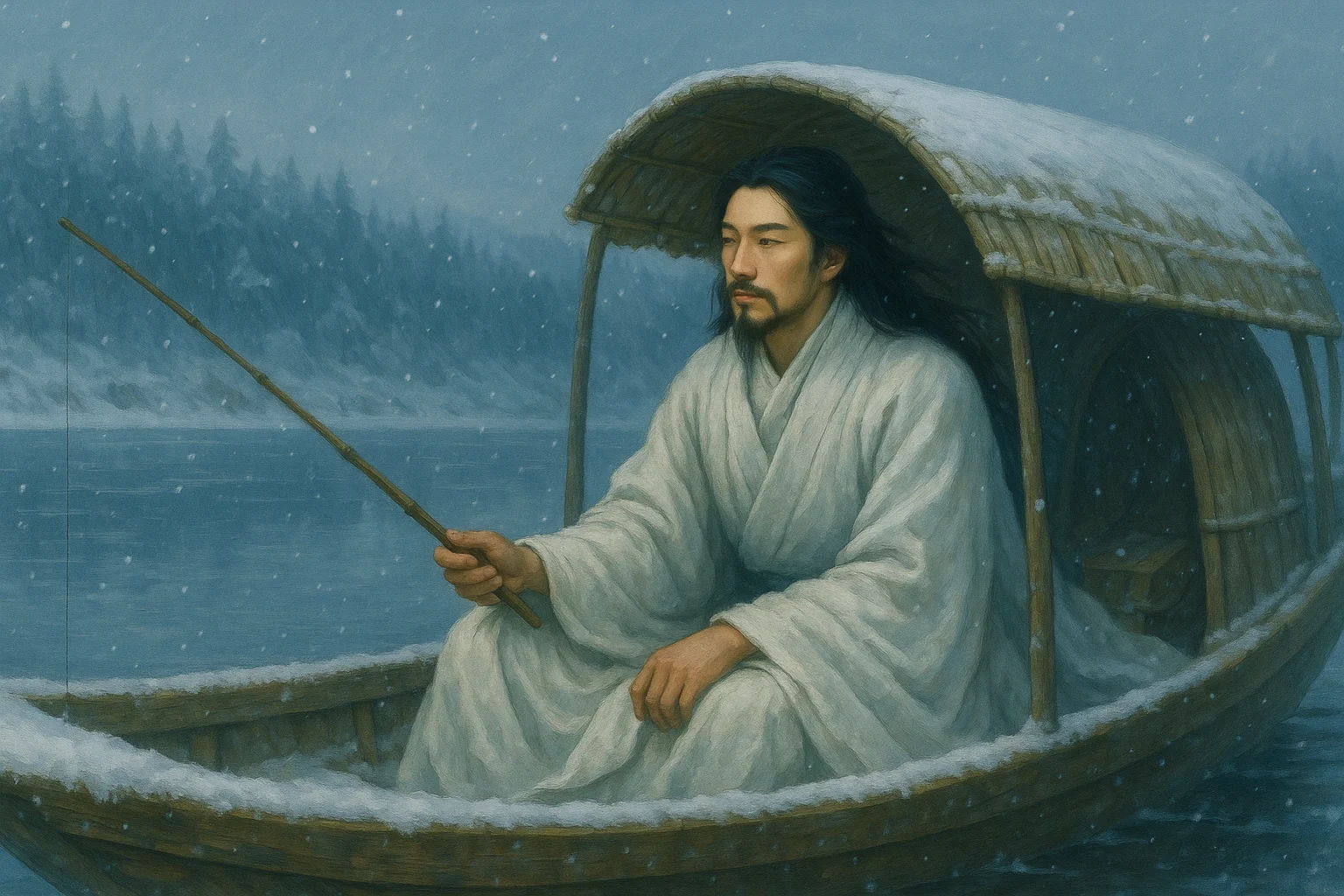Fresh-washed, I don a light hood's shade,
Yu Pool at dawn—wind and dew cascade.
In tune with realms beyond the dust,
How much more with this hermit just!
Rosy clouds scatter—peaks stretch wide,
Sky's vault—a few wild geese cried.
Leave cunning ways to those in power,
Let me be Fuxi's fool this hour!
Original Poem
「旦携谢山人至愚池」
柳宗元
新沐换轻帻,晓池风露清。
自谐尘外意,况与幽人行。
霞散众山迥,天高数雁鸣。
机心付当路,聊适羲皇情。
Interpretation
Composed around 810 AD during the Yuanhe era of Emperor Xianzong's reign, this work emerges from Liu Zongyuan's prolonged exile in Yongzhou following the failed Yongzhen Reforms. Having relocated to the western banks of the Xiao River's Ran Creek (which he renamed "Fool's Creek"), the poet constructed his dwelling amidst eight deliberately "foolish" landscape features - including Fool's Pond and Fool's Pavilion - as physical manifestations of his chosen reclusion. This dawn excursion poem, written during a morning visit to Fool's Pond with the hermit Xie Shanren, masterfully intertwines pristine natural imagery with philosophical resignation, standing as a seminal work of Liu's recluse poetry.
First Couplet: "新沐换轻帻,晓池风露清。"
Xīn mù huàn qīng zé, xiǎo chí fēng lù qīng.
Hair freshly washed, light kerchief donned;
dawn pond breathes with crisp wind and dew.
The opening establishes a ritualistic purification - the cleansing of body ("freshly washed") and spirit ("crisp wind") merging in synesthetic harmony. The "light kerchief" (轻帻) symbolizes unburdened consciousness, while the suspended moment before full daylight captures liminal spiritual clarity.
Second Couplet: "自谐尘外意,况与幽人行。"
Zì xié chén wài yì, kuàng yǔ yōu rén xíng.
My nature tunes to realms beyond dust,
how much more walking with one untarnished!
Here crystallizes the poet's double alienation - from worldly affairs ("realms beyond dust") and toward kindred spirits ("one untarnished"). The grammatical inversion in "how much more" (况) underscores the hermit's catalytic role in actualizing Liu's latent detachment.
Third Couplet: "霞散众山迥,天高数雁鸣。"
Xiá sàn zhòng shān jiǒng, tiān gāo shǔ yàn míng.
Mists dissolve - distant ranges emerge;
sky vaults high - sparse geese cry.
The landscape becomes metaphysical theater: dispersing clouds mirror dissolving worldly attachments, while the "vaulting" sky and echoing goose cries create an auditory perspective of celestial vastness. The calculated emptiness between mountain and sky mirrors the poet's cultivated mental space.
Fourth Couplet: "机心付当路,聊适羲皇情。"
Jī xīn fù dāng lù, liáo shì xī huáng qíng.
Craft's scheming I leave to road's contenders,
content in Fu Xi's primal simplicity.
The concluding paradox reveals Liu's philosophical stance: the vehement rejection of political machinations ("craft's scheming") through the passive construction "leave to" (付) contrasts with the active embrace of mythical Emperor Fu Xi's pre-civilizational innocence. The modifier "content" (聊) carries the bitter aftertaste of compromised idealism.
Holistic Appreciation
This poem depicts a morning excursion to Fool's Pond with a light and elegant touch, embodying an aesthetic of "subtle yet meaningful, secluded yet not cold." Through three interwoven layers—personal action ("freshly washed, I change my light cap"), natural scenery ("morning clouds scatter," "wild geese cry"), and cultural symbolism ("recluse," "spirit of Fuxi")—the poet constructs a lyrical world blending reality and idealism, nature and humanistic reflection.
The scenery is rendered with concise clarity, yet carries profound implications. Images like "clear," "secluded," "lofty," and "distant" reflect the poet's desire to transcend worldly chaos and pursue purity, while the phrase "for momentary solace" (聊适) conceals complex emotions beneath its calm surface—tranquility masking depth, serenity veiling struggle. This stands as one of Liu Zongyuan's most philosophically rich exile poems.
Artistic Merits
- Subtle Scenery, Emotion Woven into Landscape
Natural elements—morning pond, dispersing clouds, crying geese—are simple yet extraordinary, creating an ethereal realm. The "recluse" and "Fuxi" elevate the human figure to a spiritual symbol, enriching the scene with philosophical resonance. - Organic Structure, Gradual Ascent
The four couplets progress logically: from morning setting to mental state, from reality to ideals. The first two couplets ground the body, the middle observes, and the finale aspires—a seamless flow culminating in a powerful close. - Plain Language, Profound Feeling
The diction is unadorned yet emotionally rich; the tone seems leisurely but harbors historical contemplation and personal lament, epitomizing Liu's signature "somber and measured" style.
Insights
This poem teaches that even in adversity, solace can be found in nature and stillness. Amid extreme political disillusionment, Liu Zongyuan avoids mere bitterness, instead seeking inner peace through landscapes, preserving dignity and spiritual freedom. He neither flaunts reclusion nor wholly rejects official life, adopting instead the stance of "entrusting schemes to those in power, while briefly embracing Fuxi's spirit"—a philosophy of retreat without surrender, withdrawal without soul-loss.
For modern readers, this attitude—transcendent yet self-aware, detached yet rational—offers a model for navigating hardship. Beyond worldly bustle, we too need a "Fool's Pond"—a sanctuary of clarity and ease within.
About the Poet

Liu Zongyuan (柳宗元, 773 - 819), a native of Yuncheng in Shanxi province, was a pioneering advocate of the Classical Prose Movement during China's Tang Dynasty. Awarded the prestigious jinshi degree in 793 during the Zhenyuan era, this distinguished scholar-official revolutionized Chinese literature with his groundbreaking essays. His prose works, remarkable for their incisive vigor and crystalline purity, established the canonical model for landscape travel writing that would influence generations. As a poet, Liu mastered a distinctive style of luminous clarity and solitary grandeur, securing his place among the legendary "Eight Great Masters of Tang-Song Prose" - an honor reflecting his enduring impact on Chinese literary history.












